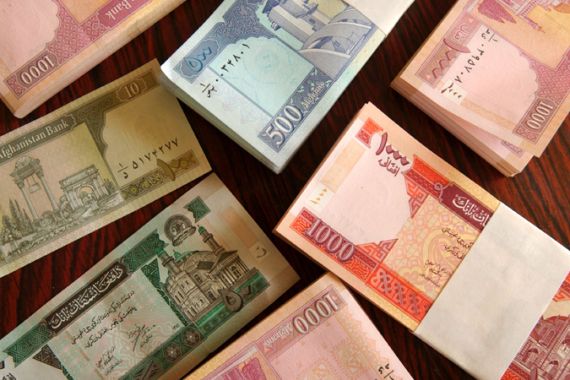Crisis spurs Afghan bank ‘takeover’
Poor balance sheet and fears of a run push central bank to seize control of Kabul Bank.

 |
| The Afghan government is worried that a run on Kabul Bank could pose security challenges [GALLO/GETTY] |
Afghanistan’s central bank has taken control over the country’s most powerful and politically connected private bank, Afghan bankers and officials say, as fears of insolvency and financial mayhem grow.
Kabul Bank, which has taken $1bn in deposits from ordinary Afghans and handles salary payments for Afghan soldiers, police and teachers, has engaged in a series of shady lending practices, central bank officials say.
Keep reading
list of 4 itemsUS imposes new sanctions on Iran after attack on Israel
A flash flood and a quiet sale highlight India’s Sikkim’s hydro problems
Why is Germany maintaining economic ties with China?
Officials fear that Kabul Bank is dangerously short on cash.
One central bank official told the Wall Street Journal that the bank’s liabilities could be “well over $300 or $400 million” – an amount far larger than its assets on hand.
Witnesses in Kabul, the Afghan capital, saw long line-ups at branches on Wednesday, leading some to fear that a run on the bank could be possible, potentially spurning conflicts between unpaid workers, private security guards and armed depositors.
‘Crony capitalism’
The bank, which is linked to several powerful Afghan politicans, and engages in risky real-estate speculation in Dubai, has become an “emblem of the cowboy crony capitalism that has helped disfigure the country since the US-led rout of the Taliban in late 2001”, according to the Washington Post.
Sherkan Farnood, Kabul Bank’s chairman, was forced to resign on Monday, after he was threatened with arrest by the Hamid Karzai, the Afghan president.
Farnood has been ordered to hand over more than $150m in luxury villas and condominiums in Dubai that he had bought with the bank’s money for various Afghan elites, including Mahmood Karzai, the president’s brother and one of the bank’s largest shareholders.
The villas, some located at the posh Palm Jumerah development in the Arabian Gulf, had been held in the name of Farnood and his wife. After authorities threatened to arrest him, Farnood agreed to transfer the properties to Kabul Bank.
Abdul Qadir Fitrat, the central bank governor, said two senior executives of Kabul Bank had not been forced from office but had resigned after the introduction of new rules forbidding shareholders from holding senior positions.
“The central bank, the government of Afghanistan, is standing behind Kabul Bank and will never allow it to collapse,” he said.
Private airline
Regulators from Afghanistan’s central bank are also concerned that funds from Kabul Bank were being unlawfully appropriated to cover losses by Pamir Airways, a private airline owned by Farnood.
Mahmood Karzai, who owns about seven per cent of Kabul Bank, praised his brother’s move against Farnood, saying it was “good for the bank and good for business in Afghanistan”.
“The concern was that the shareholders’ input was not part of the operation of the bank; there were no shareholders’ meetings,” Mahmood Karzai told the Wall Street Journal from Dubai, where he owns a villa.
“Now it’s going to be more transparent and the loans might be in line with the central bank’s requirements and international standards.”
The Afghan president chose to move on Kabul Bank after receiving evidence of the bank’s illicit dealings from Abdul Qadir Fitrat, the central bank governor, at a meeting about a month ago, the Washington Post said.
US pressure
David Petraeus, the US forces commander in Afghanistan, attended the meeting, according to Kabul Bank insiders, who spoke to the Washington Post on the condition of anonymity and said that Petraeus urged Karzai to take action.
One US official said the crackdown on mismanagement at Kabul Bank shows the Afghan government may finally be getting serious about dealing with corruption.
However, in Afghan banker with knowledge of the situation, thought the move by Hamid Karzai may have had more to do with shifting business and political alliances among the country’s elite, the Wall Street Journal reported.
In what seems like a bid to ease fears of a bank run and to calm investors, a senior Afghan official said that the central bank’s intervention took care of the problems at Kabul Bank.
“There is nothing to worry about,” he told the Washington Post.
The governor of the Afghan central bank said on Wednesday that Kabul Bank was in no danger of collapse.